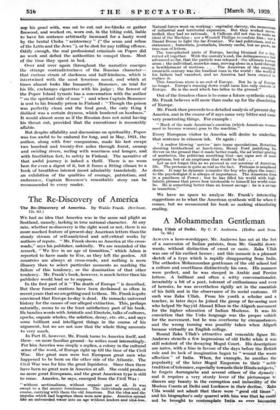The Re-Discovery of America .
WE had no idea that America was in the same sad plight as Scotland, namely, lacking in true national character. At any rate, whether re-discovery is the right word or not, there is no more marked feature of present-day American letters than the steady stream of self-analytical and self-critical works by authors of repute. " Mr. Frank shows us America at the cross- roads," says his publisher, unkindly. We are reminded of the remark, " We live in an age of transition," which Adam is reported to have made to Eve, as they left the garden. All countries are always at cross-roads, and nothing is more illusory than to select particular moments as marking the failure of this tendency, or the domination of that other tendency. Mr. Frank's book, however, is much better than his publisher would lead us to suppose.
In the first part of it " The death of Europe " is described. But these funeral orations have been declaimed so often in recent years that we are getting used to them. Mr. Frank is quite , convinced that Europe to-day is dead. He ransacks universal history for the causes of our alleged extinction. This, perhaps naturally, seems to us the least satisfactory part of his book. He bandies words with Aristotle and Einstein, talks of cultures, epochs, organic wholes, the solution, decay, etc. etc., and says some brilliant and intelligent things in the course of his argument, but we are not sure that the whole thing amounts to very much.
In Part II, however, Mr. Frank turns to America itself, and there—on more familiar ground—he writes most interestingly. For him America was simply a replica, a colony in the cultural sense of the word, of Europe right up till the time of the Civil War. Her great men were but European great men who happened to be horn on the other side of the Atlantic. The Civil War was for him the great liquidator. Since then there have been no great men in America at all. She could produce no more great Europeans, and the great American type is still to come. America, he says, emerged from the Civil War :
" without sectionalisms, without organic past at all. It was swept to a fiat atomic formlessness. The individuals survived, of course, ca with them the old Americas. But the idea and the impulse which begotten them were naw gone. America spread
like an unbounded, water into an age without leaders and idea-less. Natural forces went on working : capitalist slavery, the momentum of industrial and territorial expansion. But they worked mawn. trolled, they had no rationale. A Calhoun did not rise to make an ideal of the Machine ; nor a Wendell Phillips to confute him ; nor a Daniel Boone to light the far Frontier. We had politicians, and 4, statesmen ; humorists, journalists, literary snobs, but no poem, no true men of letters.
The transplanted parts of Europe, having bloomed for a day, rotted all together. With the century's end, the delinquescence had advanced so far, that the particle was released—the ultimate human atom ; the individual, anarchic man, moving alone in a herd through a bewilderment of motions. . . . The American of the emerging twentieth century was the loneliest man in the world : the world of his fathers had vanished, and no America had been created to replace it. This American atom is an end of Europe. But he is of Europe no longer. Europe's running down could issue him only outside of Europe. He is the seed which has fallen to the ground."
Out of the formless chaos is to come a future synthesis which Mr. Frank believes will more than make up for the dissolution of Europe.
Mr. Frank then proceeds to a detailed analysis of present-day America, and in the course of it says some very bitter and some very penetrating things. For example :
" Much of the male American's emotion (which American women need to become women) goes to the machine."
Every European visitor to America will desire to underline, that sentence in crimson ink. Or again : " A realtor blowing ' service' into inane speculations, Rotarians shouting brotherhood at lunch-time, Henry Ford justifying his flivver on the ground that it made better roads, the ad writer prating of aesthetics, the politician mouthing 'God—are signs not of mere emptiness, but of an emptiness that would be full . . .
Let us not forget this as we proceed in our scrutiny of American life. The pretense is quite as real as the fact. Pretense is misplaced desire. It may be dynamic (consider the-boy who plays the man); to the psychologist it is always of importance. The American live', in a pantheon of Power ; but he has filled his world with high. falutin phrases that prove how intolerable to himself his world must be. He is something better than an honest savage : he is a savage in transition."
We have no space to analyse Mr. Frank's interesting suggestions as to what the American synthesis will be when it comes, but we recommend his book as making stimulating reading.


















































 Previous page
Previous page